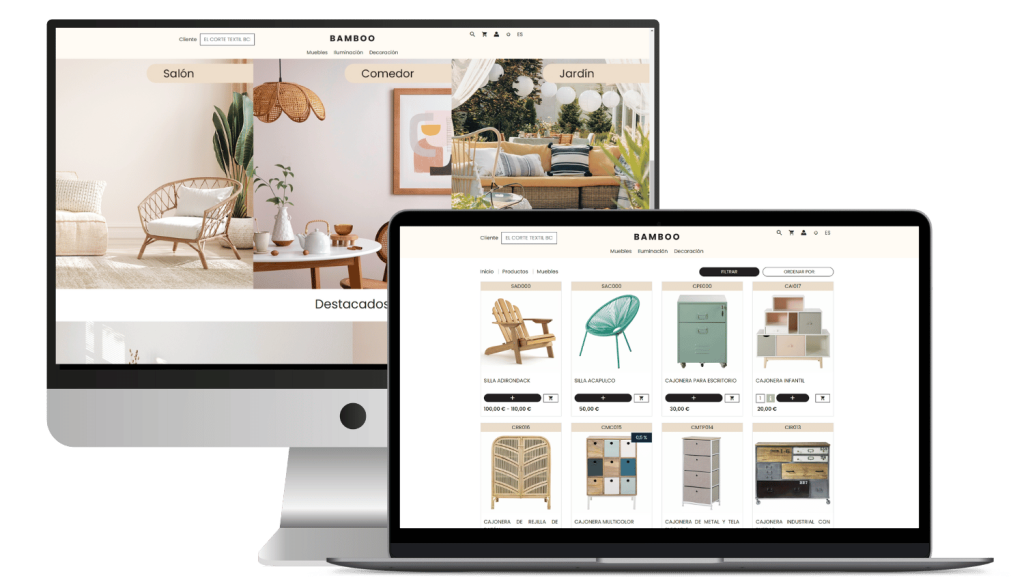
What is a marketplace? Find out how to get the most out of it
What is a marketplace? Find out how to get the most out of it In today’s digital world, marketplaces have
Companies operating in the B2B (Business to Business) B2B (Business to Business) face unique challenges in managing their business processes and relationships. A ERP (planificación de recursos empresariales) or enterprise resource planning system is a fundamental tool for managing all areas of a company in an integrated manner, helping to optimize resources, improve productivity and reduce costs. In this article we will explore the main benefits of an ERP for companies B2B COMPANIEShow it can help scale business and improve operational efficiency.

A ERP (Enterprise Resource Planning) is a system that allows companies to integrate and manage all their processes on a single platform: from finance and sales, to supply chain management, inventories and customer relations. In the B2Bwhere transactions are business-to-business, a B2B ERP facilitates coordination among multiple players, reduces errors and improves operational efficiency.
In companies B2Bcompanies, where the management of suppliers, customers and large volumes of data are essential, an ERP allows you to automate processes, optimize the supply chain and ensure that all critical information is centralized. This provides a global and real-time view of the business, which is key for strategic decision making.
Implement an ERP in a company B2B has numerous advantages that have a positive impact on efficiency, productivity and resource management. These are some of the main ones advantages of an ERP in this type of business:
Transform your ERP into a powerful B2B ecommerce system

One of the benefits of implementing an ERP is the optimization of process optimization.
El ERP automatiza tareas rutinarias, como la gestión de inventarios o la contabilidad, lo que reduce los errores humanos y acelera los tiempos de operación.
Para una empresa B2BThis means lower operating costs by eliminating redundant tasks and improving efficiency.
For example, a product distribution company that uses an ERP can synchronize its order management with logistics and inventory control, which reduces errors, improves efficiency and avoids cost overruns due to poor planning.
Supply chain management is one of the most critical aspects in the B2B environment ..
Un ERP allows you to manage and optimize the entire supply chain in real time, from raw material procurement to final product delivery. This ensures that quick and effective decisions can be made, avoiding bottlenecks and optimizing the relationship with suppliers.
For example, a manufacturing company may use an ERP to track the status of raw materials, plan production according to demand, and coordinate distribution logistics, improving workflow and reducing delivery times.
By centralizing information and automating processes, an ERP ERP increases efficiency and productivity of the employees. With an ERP, sales, finance and production departments work with the same data, avoiding duplication and errors. This is especially relevant in companies B2B with complex operations that require collaboration between several teams.
For example, a service company can automate invoicing and resource allocation using an ERPThis saves time and allows teams to concentrate on higher value-added tasks.
A ERP improves the integration with suppliers and customersby providing greater transparency and fluidity in business relationships. By enabling customers and suppliers to access key information, such as order status or inventory forecasts, ERP fosters closer and more efficient collaboration.
For example, a B2B ERP can facilitate integration with suppliers’ systems, allowing automatic ordering when inventory falls below a certain level, or with customers, who can check the status of their orders in real time.
One of the great advantages of an ERP is its ability to scale with the business. The companies B2B companies tend to grow rapidly, and an ERP ensures that this growth is not accompanied by management or control problems. As the company grows, the ERP adapts to handle more customers, products and operations, while maintaining efficiency and control.
For example, a company that starts with domestic operations can expand internationally without complications, as the ERP centralizes all information and makes it possible to manage multiple branches or markets from a single system.

The security security is vital for any B2B company. B2B.
Un ERP ensures that all data is protected through advanced security mechanisms, such as encryption and access control. It also ensures that the information stored is accurate and up-to-date, which is key to data-driven decision making.
In environments B2Benvironments, where confidential information about suppliers, contracts and customers is handled, an ERP ensures that data is protected from unauthorized access and complies with data protection regulations.
The adoption of ERP SaaS (Software as a Service) in B2B B2B has grown in recent years due to the benefits it offers, such as flexibility, accessibility and cost reduction.
One of the biggest advantages of SaaS ERP is the possibility of accessing the system from anywhere and at any time, as long as you have an Internet connection. This is especially useful for companies B2B with distributed teams or that need to make quick decisions based on real-time data.
For example, a sales team at a trade show can access the customer database via their mobile device and generate quotes instantly, speeding up the sales process.
The SaaS ERP do not require initial investments in server infrastructure, resulting in significant savings in hardware and maintenance costs. In addition, since they are hosted in the cloud, the ERP takes care of upgrades, maintenance and security, reducing the burden on the company’s IT team.
This pay-per-subscription model also allows companies to B2B companies to adjust costs as their needs grow or change, ensuring that unnecessary expenses are not incurred.
Integrate your ERP with B2B ecommerce with Stoam SaaS

Each company B2B has specific needs, and an ERP can be adapted to these particularities through customization of modules, workflows and integrations. This flexibility allows companies to configure the system according to their operational needs, which maximizes the benefits of ERP.
For example, a manufacturing company may require specific modules for production planning, while a service company may need a more focused approach to project management and billing. The ERP ERP systems allow for this flexibility, ensuring that each company gets the most out of the implementation.
An international logistics company that handled thousands of shipments per day decided to implement an ERP to optimize their processes. Before ERP, the sales, operations and finance teams worked with independent systems, which generated coordination errors. After ERP implementation, the company was able to integrate all the information on a single platform, reducing delivery times by 30% and improving customer satisfaction.
An industrial machinery manufacturer, with a complex international supply chain, implemented an B2B ERP to better manage its inventories and production. With ERP, the company automated the ordering of raw materials, which enabled it to reduce stock by 20%, avoid overproduction and improve its relationship with suppliers. In addition, the company saw an increase in the productivity of its employees, who could now access accurate, real-time information on manufacturing processes.

The selection of an ERP is a strategic decision that can have a significant impact on a company’s success. B2B.
Aquí algunos factores clave a considerar:
Some of the most important factors to take into account when choosing a B2B ERP are:
The integration of an ERP with e-commerce platforms and customer management systems (CRM) is essential in the B2B environment. B2Bwhere transactions are often more complex and require constant coordination between various departments and external stakeholders.
The future of ERP in the B2B B2B is marked by artificial intelligence (AI), machine learning and robotic process automation (RPA), which enable ERP systems to be more proactive and predictive, helping companies to anticipate demands, optimize resources and improve decision-making.
This article reflects on how an ERP can transform a B2B company, offering benefits ranging from process optimization to increased security and scalability. Implementing the right ERP can be the key to improving competitiveness in a market as dynamic as B2B.
Share:

What is a marketplace? Find out how to get the most out of it In today’s digital world, marketplaces have

Business to consumer (B2C): how it works and how it differs from B2B In today’s world, e-commerce and direct business-to-consumer

Alibaba revolutionises B2B commerce with ‘Accio’ – the AI-powered search engine for SMEs Share: Tabla de contenidos What is Accio

Examples of market segmentation: How to apply it in different sectors? In today’s competitive business landscape, market segmentation is more

Omni-channel strategy: How to integrate all channels to improve customer experience In a world where consumers use multiple channels to

What are open APIs and their role in SaaS solutions? Open APIs have transformed the way businesses use software, especially

Analysis of B2B marketplaces: Are they an opportunity or a threat? B2B marketplaces are transforming the way companies buy and

How to use chatbots in B2B ecommerce to improve conversions In the world of ecommerce B2B (Business to Business)shopper expectations

ERP and sustainability: How a system can reduce environmental impact Sustainability has become a crucial priority in today’s business landscape.
Automate orders with Stoam SaaS b2b ecommerce
